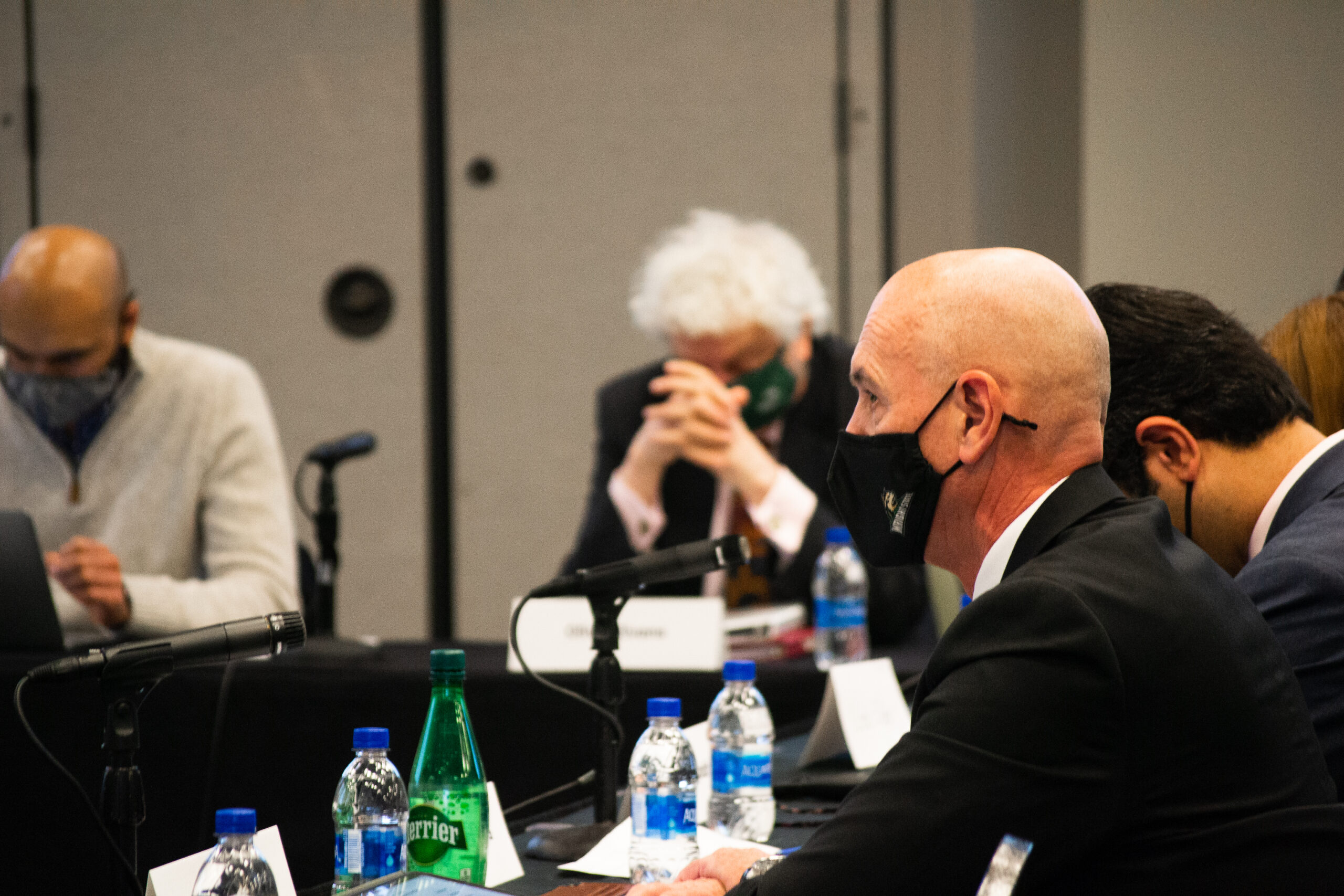
Board of Trustees | Photo by Caitlin Shatsby | The Wright State Guardian
Wright State University (WSU) Board of Trustees (BOT) held two days of meetings to discuss the Nutter Center, finances, student involvement and updated hazing policies.
Nutter Center management
WSU BOT began its Dec. 9 committee day with another meeting of the Finance, Audit, Governance and Compliance Committee.
Continuing their Nov. 16 discussion on the University’s Fiscal Year (FY) 2022 financial standing, the Committee also moved to approve contracts and expenditures for WSU services.
One of the two contracts that were approved was the $200,000 contract between ASM Global and WSU. ASM is an event space management company.
Gregory Sample, Executive Vice President and Chief Financial Officer, first brought the contract to the Board’s attention during the Sep. 17, full public session. The contract allows ASM to manage marketing, booking and related services for the Wright State Nutter Center according to the contract resolution.
According to Sample, this relationship will not incur extra expenses for the university.
“The benefit of the relationship with ASM Global is that there is no out-of-pocket expense to the University,” Sample said.
It is unclear how this will affect current Nutter Center employees and events.
Tuition increases
The Committee also discussed a tuition increase for the upcoming freshman class of 2026.
Each class or cohort is placed in a tuition guarantee program, which is a fixed amount students pay each year for tuition based on what academic year they start in.
Resolution 22 would give WSU President Sue Edwards the power to increase tuition rates for cohort five up to 2%, and set housing and meal plan rates for the academic year 2022-2023.
According to University data, tuition guarantee rates have been steadily increasing. For those who first enrolled in the academic year 2018-2019, tuition rates were $4,627 for Ohio residents and $9,336 for non-residents. In the academic year 2019-2021, the rates each increased by $162 and for the academic year 2020-2021, the rates increased by $192.
The new increase for the incoming class will be based on inflation and market rates according to the resolution.
Efficiency report
The Committee discussed the FY2021 Affordability and Efficiency Report. Required by Ohio law, this report reviews WSU’s operational efficiency, academic practices, policy reforms, student benefits and future goals of the University.
The report outlines ways the university can save on programs and reduce costs for students.
The full board approved the report and its recommendations.
Read more on the full report here.
Student involvement
The Academic and Students Affairs Committee, which met in public session on Dec.10, focused on enrollment, student involvement and student life.
During her report to the board, Edwards presented the current enrollment numbers heading into spring semester 2022. The current census headcount for spring rests at 7,826 students attending Dayton main campus, down from 10,117 students last spring semester according to university data.
Not only have enrollment numbers declined steadily over the last four years, so has student involvement. During their reports, Student Government Association President Jonathan Ciero and student trustee Dhishant Asarpota discussed concerns regarding declining student involvement.
Ciero and Asarpota cite different aspects of the COVID-19 pandemic as reasons for declining student involvement. Asarpota explained how online events provided more convenience for students during COVID causing the decline in participation for in-person events.
Ciero cites difficulties in recruitment coming out of the pandemic as a cause for the decline.
“[We are] starting to have some really low student involvement in certain organizations,” Ciero said. “A lot of those organizations are wondering if they are going to be able to exist from this year to [the] next”.
Hazing policies
Collins Law, the Ohio law that criminalizes hazing in any student organization, went into effect on Oct. 7.
Gina Keucher, program director for fraternity and sorority life, discussed new programs and policies WSU would be implementing to follow the new law.
Now every WSU student including graduate and medical students will have to complete anti-hazing education. For incoming students, this will take place during in-person orientation, according to Keucher. It is uncertain what this training will look like for existing students.
Additionally, fraternities and sororities will undergo a new accreditation process that includes anti-hazing. They will have to complete this process in order to remain registered organizations.
More information on these policies can be found on Wright States’ hazing information website.
